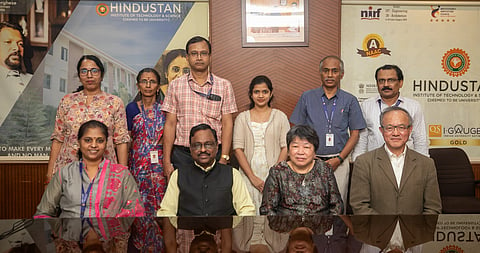

In a major progress towards fighting climate change, Professor Indrajit Shown from the Chemistry Department at Hindustan Institute of Technology and Science (HITS), Chennai, has developed a photocatalytic system which transforms harmful Carbon dioxide (CO2) into valuable renewable fuels using sunlight.
This research marks a great advancement in green chemistry and aligns with multiple United Nations Sustainable Development Goals (SDGs), as it was published in the prestigious journal Nano Energy.
In collaboration with Dr Li-Chyong Chen’s team from National Taiwan University, Professor Indrajit engineered a novel ZnS/ZnIn2S4 (ZIS) heterostructure photocatalyst. This ingenious material utilises solar energy to efficiently convert CO2 into hydrocarbons, especially acetaldehyde (C2H4O), a vital step towards sustainable fuel production.
“This research is a critical step in converting CO2 — a major greenhouse gas, into valuable resources,” says Professor Indrajit Shown as he goes on to add that their goal was not just a scientific discovery but to find a real-world solution to fight climate change, stated a press release from the institute.
This advanced ZnS/ZIS composite has shown a quantum efficiency 200 times higher than conventional ZnS-based methods, notably improving the process of CO2 reduction.
Unlike previous approaches, the system selectively produces acetaldehyde using visible light, a crucial advancement in green fuel technology. Stringent isotope-labelled 13CO2 testing confirmed that the hydrocarbons generated originated directly from CO2 photoreduction, eliminating contamination concerns.
This research contributes straight to SDG 7 (Affordable and clean energy), SDG 13(Climate Action), SDG 9(Industry, Innovation and Infrastructure), and SDG 12 (Responsible Consumption and Production.)
Vice-Chancellor of HITS Colonel Dr SN Sridhara noted that this groundbreaking research by Professor Indrajit and his team furnishes creative solutions for a sustainable future. By harnessing solar energy to convert CO2 into useful fuels, this research not only advances scientific knowledge but also provides a tangible pathway to addressing one of the world’s most pressing environmental challenges.
The research team is currently exploring Artificial Intelligence (AI)-driven approaches to discover further efficient photocatalysts, promising additional breakthroughs in this critical field.
